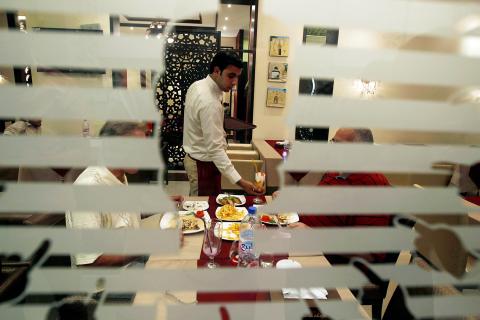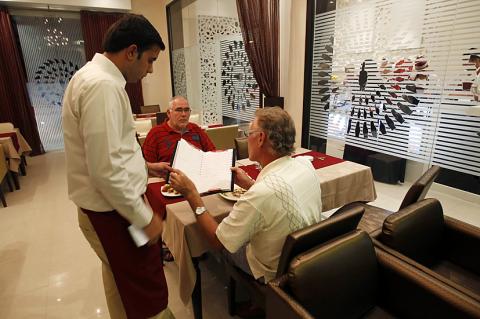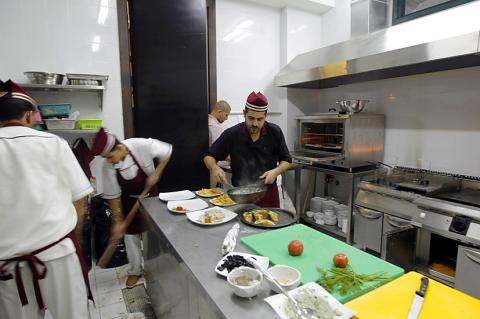At first glance, the Atfaluna restaurant in Gaza City looks like any other — a space for locals to enjoy a simple meal. However, there’s a difference: Nearly all its staff are deaf.
Inside, customers chat with each other and scan the menu, but when it comes to ordering, their requests are taken down by waiters who communicate in sign language, and their meals are all cooked by deaf chefs.
It’s a one-of-a-kind concept in Gaza and the brainchild of a local organization called Atfaluna — Arabic for “Our Children” — which works to improve the lives of the territory’s deaf.

AFP PHOTO/MOHAMMED ABED
The project has the twin goals of raising awareness about the needs and capabilities of the deaf, while giving the community a way to earn a living in a place where unemployment stands at 45 percent.
Ahmed Dahman, expressing himself shyly through a sign language translator, described how working at the restaurant has changed his life.
“It gave me a sense of security regarding my future and self-dependency because job opportunities were virtually non-existent before this,” he said.

AFP PHOTO/MOHAMMED ABED
“We’ve seen a lot of support and cooperation from people,” he said. “A lot of them expressed their interest in learning sign language.”
For Dahman and others employed at the restaurant, where sign language letters decorate the walls, Atfaluna is a rare opportunity for work.
Until a few months ago, education opportunities for the deaf in Gaza only ran to ninth grade, with no secondary or university level education available.

AFP PHOTO/MOHAMMED ABED
A new secondary school has just opened, and Atfaluna is working with universities to make courses available for the deaf, but most working-age members of the community find themselves with few marketable skills.
“There is a real shortage of jobs for deaf people in Gaza. Of course they are at a big disadvantage because of the educational shortages,” said Dalia Abu Amr of Atfaluna.
Diners enter through an elaborate arabesque doorway above which hangs the restaurant’s name written in white on a black background — in English, Arabic and sign language.
Inside, a hostess in a traditionally-embroidered Palestinian gown guides people to their table. Handicrafts made in Atfaluna’s job creation programs are also available for sale.
The fare on offer ranges from Middle Eastern staples like hummus and baba ghanoush to fried fish, chicken or curry dishes.
“We came here to see the place,” said Shahd al-Iyla, a 21-year-old student dining with a friend. “It was nice, we would love to come here to offer moral support, so we will come again.”
Abu Amr said 12 of the restaurant’s 14 staff are deaf. The only exceptions are the chef and the accountant, who answers the phone to take reservations and delivery orders.
“The team of 12 deaf workers received culinary and hospitality training,” Abu Amr said. The project hopes “to assimilate the deaf in Gaza into society and provide them with work opportunities.”
Around 1.5 percent of Gazans over the age of five have some form of hearing disability, according to Atfaluna, but the disability still carries a stigma.
“No one welcomes the idea of a deaf person working in Gaza,” said 35-year-old Niveen al-Quqa, as she garnished a dish about to leave the kitchen.
She took art classes and sewing lessons in a bid to find work, but until the restaurant opened, she had had no success.
Now she is one of five women employed at Atfaluna — four in the kitchen and one working as a waitress.
“I am looking forward to improving my culinary skills so my colleagues and I can prove ourselves, despite our disability. I am very happy now,” she added with a smile.
The restaurant’s chef, 30-year-old Hassan Addabus, hovered nearby as his charges worked, giving them pointers on their technique in sign language.
“I have been doing this for 10 years and it was always about doing a job I love, but today it means much more than that,” he said. “It has a moral and human significance because of the support it offers to people with disabilities in our society who deserve all of our help.”
Amina al-Omari, 22, also hard at work in the kitchen, said the job had given her a new sense of self.
“Society has no idea about our needs,” she explained. “I felt subject to injustice and oppression because of this, but those feelings started to fade away after I started working here and becoming independent.”
“We are capable of proving our skills and excellence. We might be deaf, but we have a lot of potential,” she added.

This month the government ordered a one-year block of Xiaohongshu (小紅書) or Rednote, a Chinese social media platform with more than 3 million users in Taiwan. The government pointed to widespread fraud activity on the platform, along with cybersecurity failures. Officials said that they had reached out to the company and asked it to change. However, they received no response. The pro-China parties, the Chinese Nationalist Party (KMT) and Taiwan People’s Party (TPP), immediately swung into action, denouncing the ban as an attack on free speech. This “free speech” claim was then echoed by the People’s Republic of China (PRC),

Exceptions to the rule are sometimes revealing. For a brief few years, there was an emerging ideological split between the Democratic Progressive Party (DPP) and Chinese Nationalist Party (KMT) that appeared to be pushing the DPP in a direction that would be considered more liberal, and the KMT more conservative. In the previous column, “The KMT-DPP’s bureaucrat-led developmental state” (Dec. 11, page 12), we examined how Taiwan’s democratic system developed, and how both the two main parties largely accepted a similar consensus on how Taiwan should be run domestically and did not split along the left-right lines more familiar in

As I finally slid into the warm embrace of the hot, clifftop pool, it was a serene moment of reflection. The sound of the river reflected off the cave walls, the white of our camping lights reflected off the dark, shimmering surface of the water, and I reflected on how fortunate I was to be here. After all, the beautiful walk through narrow canyons that had brought us here had been inaccessible for five years — and will be again soon. The day had started at the Huisun Forest Area (惠蓀林場), at the end of Nantou County Route 80, north and east

Specialty sandwiches loaded with the contents of an entire charcuterie board, overflowing with sauces, creams and all manner of creative add-ons, is perhaps one of the biggest global food trends of this year. From London to New York, lines form down the block for mortadella, burrata, pistachio and more stuffed between slices of fresh sourdough, rye or focaccia. To try the trend in Taipei, Munchies Mafia is for sure the spot — could this be the best sandwich in town? Carlos from Spain and Sergio from Mexico opened this spot just seven months ago. The two met working in the